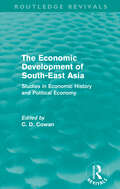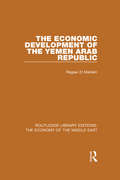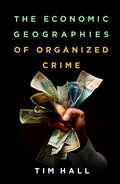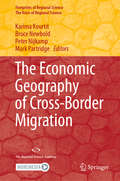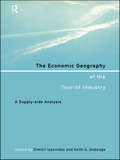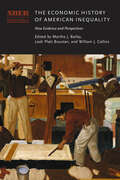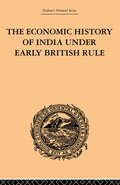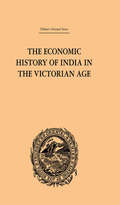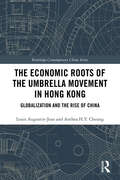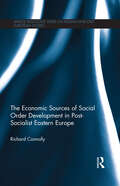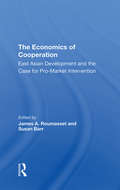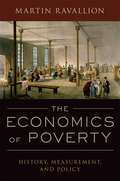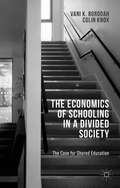- Table View
- List View
The Economic Development of South-East Asia: Studies in Economic History and Political Economy (Routledge Revivals)
by C. D. CowanFirst published in 1964, The Economic Development of South-East Asia: Studies in economic history and political economy contains eight papers originally written for a study group at the School of Oriental and African Studies in London. The papers, edited by Professor C. D. Cowan, are written against a background of economic underdevelopment in large parts of Asia. Economic problems increasingly plagued the governments of Asia after the Second World War, and while Western governments were willing to help foster economic development, relations with Asian governments were somewhat hindered by the heritage of their colonial past. Problems also related to the growth of traditional trading ports and export crops, and to the importation of colonial regimes, western funds and skills in the nineteenth century. Such developments come under the loosely generalised concept of imperialism, with its strongly emotional overtones, whose use impedes the objective assessment and analysis of facts. While we understand a good deal about conditions of economic growth in the West, much of what has fostered or retarded growth in other parts of the world remains less clear.
The Economic Development of the United Arab Emirates (Routledge Library Editions: The Economy of the Middle East)
by Ragaei el MallakhSince the early 1970s the oil producing countries of the Gulf have become a focus of intense interest worldwide. Most of this interest has centred on the oil giants, Saudi Arabia, Iran, even Iraq and Kuwait. Yet the United Arab Emirates is also among the largest producers, on a par with Kuwait, Nigeria and Libya, with reserves greater than the USA. Given its high economic growth rate, the UAE is an excellent laboratory in which to test and evaluate policies and programmes to effect rapid economic development. The international stature of the UAE far exceeds what its physical size, population and breadth of resources would seem to indicate. As a member of OPEC, the UAE has played a vital role within that body’s ‘price moderates’. With one of the world’s highest per capita incomes and with ambitious development efforts under way, the UAE, not surprisingly, has become a major market for capital and consumer goods, involving substantial foreign services, banking, business and industry. Based on more than a decade of study, on-site research and interviews with key figures, this book – which mixes the practical with the academic approach – will prove of great value to Middle Eastern and development specialists, students and to the international business and financial communities. First published in 1981.
The Economic Development of the Yemen Arab Republic (Routledge Library Editions: The Economy of the Middle East)
by Ragaei el MallakhThe recent economic development of the Yemen Arab Republic is in stark contrast to the centuries of isolation that had marked the country prior to the 1962 Revolution. When economic planning was instituted in the 1970s, the nation was confronted by the needs of reconstruction after years of conflict, and of development. A formidable task was faced in the need to establish basic infrastructure throughout a country with a widely dispersed population and with extremely rugged terrain. In addition, the economy has been characterized by the high percentage of the workforce attracted overseas as migrant workers. This book provides the first comprehensive study of the economic development of this under-studied nation. First published in 1986.
The Economic Geographies of Organized Crime
by Tim HallIllicit and illegal markets play a substantial role in the global economy, yet have received little attention from economic geographers. This incisive, innovative book examines the spatial dimensions of hidden economic practices and asks how organized crime can be understood empirically and conceptually through a geographical lens. Going beyond stereotypes about gangsters, the book explores the role of spatially distant corporate, state, and criminal actors in such activities as trafficking and smuggling of drugs, people, and goods; counterfeiting; cybercrime; corruption; money laundering; financing of terrorist groups; and environmental crime. It suggests ways that a geographical analysis can contribute to improving policies and practices to curb organized crime at the regional, national, and global levels.
The Economic Geography of Cross-Border Migration (Footprints of Regional Science)
by Peter Nijkamp Karima Kourtit Bruce Newbold Mark PartridgeThis handbook presents a collection of high-quality, authoritative scientific contributions on cross-border migration, written by a carefully selected group of recognized migration experts from around the globe. In recent years, cross-border migration has become an important and intriguing issue, from both a scientific and policy perspective. In the ‘age of migration’, the volume of cross-border movements of people continues to rise, while the nature of migration flows – in terms of the determinants, length of stay, effects on the sending and host countries, and legal status of migrants – is changing dramatically. Based on a detailed economic-geographical analysis, this handbook studies the motives for cross-border migration, the socio-economic implications for sending countries and regions, the locational choice determinants for cross-border migrants, and the manifold economic-geographic consequences for host countries and regions. Given the complexity of migration decisions and their local or regional impacts, a systematic typology of migrants (motives, legal status, level of education, gender, age, singles or families, etc.) is provided, together with an assessment of push factors in the place of origin and pull factors at the destination. On the basis of a solid analytical framework and reliable empirical evidence, it examines the impacts of emigration for sending areas and of immigration for receiving areas, and provides a comprehensive discussion of the policy dimensions of cross-border migration.
The Economic Geography of the Tourist Industry: A Supply-Side Analysis
by Dimitri Ioannides Keith G. DebbageThe Economic Geography of the Tourist Industry bridges the gap between tourism research and economic geography by bringing together leading academics in geography, planning and tourism. The authors explain tourism's definitions and examine whether tourism can be categorized as an industry. They provide detailed analyses of key sectors, such as tour
The Economic History of American Inequality: New Evidence and Perspectives (National Bureau of Economic Research Conference Report)
by Martha J. Bailey, Leah Platt Boustan, and William J. CollinsA meticulous examination of the history and roots of economic inequality within the United States. This volume refines and extends the economic history literature on economic inequality in the United States. Economic inequality manifests itself on various dimensions, including access to resources and economic security, as well as access to education and opportunities for migration, marriage, and other important life decisions. Measuring inequality and studying its variation over time and in response to economic shocks such as recessions and wars deepen our understanding of how the economy operates and can inform the design of public policies. The studies in this compendium present comprehensive evidence on income distribution during the nineteenth and early twentieth centuries, drawing on new data on wages and prices. They also consider disparities in economic well-being that are reflected in outcomes other than wage and salary income, such as homeownership and marriage. The volume also presents new evidence on the effects of income inequality on social outcomes. It concludes with an intellectual history of “human capital,” a core concept in the economic analysis of the underpinnings of labor market inequality.
The Economic History of India Under Early British Rule: From the Rise of the British Power in 1757 to the Accession of Queen Victoria in 1837
by Romesh Chunder DuttThis is Volume V of eleven in a series on India: History, Economy and Society. Originally published in 1950, this study charts the history from the Rise of the British power in 1757 to the Accession of Queen Victoria in 1837.
The Economic History of India in the Victorian Age: From the Accession of Queen Victoria in 1837 to the Commencement of the Twentieth Century
by Romesh Chunder DuttFirst Published in 2000. Routledge is an imprint of Taylor & Francis, an informa company.
The Economic Implications of Advertising (Routledge Library Editions: Advertising)
by Otto John FirestoneIs advertising a factor that contributes to rising costs and prices? This study, commissioned to answer just that question by the Institute of Canadian Advertising, examines the effect of advertising on the Canadian economy, on business, the consumer, costs and prices, productivity, competition, employment, social welfare and economic growth. The Economic Implications of Advertising provides a valuable insight into a little-studied area of advertising, and will be of great interest to students of the industry everywhere. First published in 1967.
The Economic Logic of Chinese Cultural-Creative Industries Parks: Shenzhen and Guangzhou
by Vivian Yuan YuanThis book is a novel and inspiring research work on creative industry clusters in China. Seldom has literature on CCIPs dealt with the detailed economic logic and operational methods of a CCIP. The author not only does a detailed comparison of two business models of Cultural-Creative Industries Parks (CCIPs) using classic qualitative methodology through two case studies, Shenzhen OCT-LOFT as a “Culture Highland” model and Guangzhou 289 Art Park as a “Modular System” model, but also proposes a practical 4C model as the business framework for CCIPs. This book will be of interest to urbanists, scholars of the culture economy, creative industries and China scholars.
The Economic Naturalist: In Search Of Explanations For Everyday Enigmas
by Robert H. FrankWhy do the keypads on drive-up cash machines have Braille dots? Why are round-trip fares from Orlando to Kansas City higher than those from Kansas City to Orlando? For decades, Robert Frank has been asking his economics students to pose and answer questions like these as a way of learning how economic principles operate in the real world-which they do everywhere, all the time. Once you learn to think like an economist, all kinds of puzzling observations start to make sense. Drive-up ATM keypads have Braille dots because it's cheaper to make the same machine for both drive-up and walk-up locations. Travelers from Kansas City to Orlando pay less because they are usually price-sensitive tourists with many choices of destination, whereas travelers originating from Orlando typically choose Kansas City for specific family or business reasons. The Economic Naturalist employs basic economic principles to answer scores of intriguing questions from everyday life, and, along the way, introduces key ideas such as the cost-benefit principle, the "no cash on the table" principle, and the law of one price. This is as delightful and painless a way to learn fundamental economics as there is.
The Economic Rise of East Asia: Development Paths of Japan, South Korea, and China (Contributions to Economics)
by Helmut Wagner Linda GlaweIn light of the growing global economic importance of East Asia, this book analyzes and compares the extraordinary development paths and strategies of Japan, South Korea, and China. It examines both the factors that enabled these countries’ prolonged periods of high-speed economic growth, and the reasons for their subsequent “cool-downs.” In addition, the book illustrates how their development strategies served as role models for one another, and what current and future developing countries can learn from the East Asian success stories. This book will appeal to scholars and students of economics and development studies with an interest in the East Asian development model.
The Economic Roots Of Conflict And Cooperation In Africa
by Natalia Mirovitskaya William AscherThis book combines overviews of the nature and causes of inter-group violence in North Africa and sub-Saharan Africa with a collection of country case studies. Both the overview chapter and the case studies trace how economic policy initiatives, and consequent changes in the roles and statuses of various groups, shape conflict or cooperation.
The Economic Roots of the Umbrella Movement in Hong Kong: Globalization and the Rise of China (Routledge Contemporary China Series)
by Louis Augustin-Jean Anthea H.Y. CheungIn the autumn of 2014, thousands of people, young and educated in their majority, occupied the chief business district and seat of the government in Hong Kong. The protest, known as the Umbrella Movement, called for ‘genuine democracy’, as well as a fairer social and economic system. The book aims to provide a dynamic framework to explain why socioeconomic forces converged to produce such a situation. Examining increasing inequality, rising prices and stagnating incomes, it stresses the role of economic and social factors, as opposed to the domestic political and constitutional issues often assumed to be the root cause behind the protests. It first argues that globalization and the increasing influence of China’s economy in Hong Kong has weighted on salaries. Second, it shows that the oligopolistic nature of the local economy has generated rents, which have reinforced inequality. The book demonstrates that the younger generation, which is still finding its place in society, has been particularly affected by these phenomena, especially with social mobility at a low point. Offering a new approach to studying the Umbrella Movement, this book will appeal to students and scholars interested in Hong Kong's political landscape, as well Chinese politics more broadly.
The Economic Sociology of Capitalism
by Victor Nee & Richard SwedbergThis book represents a major step forward in the use of economic sociology to illuminate the nature and workings of capitalism amid the far-reaching changes of the contemporary era of global capitalism. For the past twenty years economic sociologists have focused on mesa-level phenomena of networks, but they have done relatively little to analyze capitalism as an overall system or to show how such phenomena emerge from and shape the dynamics of capitalism. The Economic Sociology of Capitalism seeks to change this, by presenting both big-picture analyses of capitalism and more focused pieces on institutions crucial to capitalism. The book, which includes sixteen chapters by leading scholars in economic sociology, is organized around three broad themes. <P><P>The first section addresses core issues and problems in the new study of capitalism; the second considers a variety of topics concerning America, the leading capitalist economy of the world; and the third focuses attention on the question of convergence stemming from the global transformation of capitalism and the challenge of explaining institutional change. The contributions, which follow a foreword by economic historian Avner Greif and the editor's introduction, are by Mitchel Abolafia, James Baron and Michael Hannan, Mary C. Brinton, John Campbell, Gerald Davis and Christopher Marquis, Paul DiMaggio and Joseph Cohen, Peter Evans, Neil Fligstein, John Freeman, Francis Fukuyama, Ko Kuwabara, Victor Nee, Douglass C. North, AnnaLee Saxenian, Richard Swedberg, and Viviana Zelizer.
The Economic Sources of Social Order Development in Post-Socialist Eastern Europe (BASEES/Routledge Series on Russian and East European Studies)
by Richard ConnollyNearly twenty years after the collapse of socialism, the countries of post-socialist Eastern Europe have experienced divergent trajectories of political development. This book looks at why this is the case, based on the assumption that societies, or social orders, can be distinguished by the extent to which competitive tendencies contained within them – economic, political, social and cultural – are resolved according to open, rule-based processes. The book explores which economic conditions allow for increased levels of political competition, and it tests the hypothesis that the nature of a country’s ties with the international economy, and the level of competition within a country’s economic system, will shape the trajectory of political competition within that society. The book goes on to argue that after several decades of relative ‘bloc autarky’ during the socialist period, the ongoing process of reintegration with the international economy across the post-socialist region has resulted in distinct patterns of structural economic development, and that that these patterns are of crucial importance in explaining the variation in social order type across the post-socialist region. By offering a more precise analysis of the causal mechanisms that link economic and political competition, the book makes a useful contribution to research on the different patterns of political behaviour that have been observed across the post-socialist region since the collapse of the socialist regimes.
The Economic Status of the Aged
by Peter O. SteinerThis title is part of UC Press's Voices Revived program, which commemorates University of California Press’s mission to seek out and cultivate the brightest minds and give them voice, reach, and impact. Drawing on a backlist dating to 1893, Voices Revived makes high-quality, peer-reviewed scholarship accessible once again using print-on-demand technology. This title was originally published in 1957.
The Economic System and Income Distribution in Yugoslavia
by Henryk FlakierskiThis is the second volume in the author's ongoing inquiry into the extent of income inequality in the East European socialist countries and the effect of market-oriented reforms on patterns of income distribution. Although there has been remarkably little empirical research on this question (in part because of the problem of obtaining reliable data), both proponents and opponents of reforms voice strong views on this subject, with both sides, however, tending to grant the assumption that decentralization and the increased use of market mechanisms will increase inequality. In this study as in the preceding volume, "Economic Reform and Income Distribution: A Case Study of Hungary and Poland", Henryk Flakierski undertakes a study of the data in order to shed light on this question - this time with reference to the most decentralized of the East European economics and the one in which marketization of the economy has been most advanced.
The Economic and Fiscal Consequences of Immigration
by Engineering Medicine National Academies of SciencesThe Economic and Fiscal Consequences of Immigration finds that the long-term impact of immigration on the wages and employment of native-born workers overall is very small, and that any negative impacts are most likely to be found for prior immigrants or native-born high school dropouts. First-generation immigrants are more costly to governments than are the native-born, but the second generation are among the strongest fiscal and economic contributors in the U.S. This report concludes that immigration has an overall positive impact on long-run economic growth in the U.S. More than 40 million people living in the United States were born in other countries, and almost an equal number have at least one foreign-born parent. Together, the first generation (foreign-born) and second generation (children of the foreign-born) comprise almost one in four Americans. It comes as little surprise, then, that many U.S. residents view immigration as a major policy issue facing the nation. Not only does immigration affect the environment in which everyone lives, learns, and works, but it also interacts with nearly every policy area of concern, from jobs and the economy, education, and health care, to federal, state, and local government budgets. The changing patterns of immigration and the evolving consequences for American society, institutions, and the economy continue to fuel public policy debate that plays out at the national, state, and local levels. The Economic and Fiscal Consequences of Immigration assesses the impact of dynamic immigration processes on economic and fiscal outcomes for the United States, a major destination of world population movements. This report will be a fundamental resource for policy makers and law makers at the federal, state, and local levels but extends to the general public, nongovernmental organizations, the business community, educational institutions, and the research community.
The Economic and Social Impact of the COVID-19 Pandemic: Romania in a European Context (Contributions to Economics)
by Valentina Vasile Elena BunduchiThis volume examines the effects of the COVID-19 pandemic on the labor market and the business environment in the European Union (EU), with a specific focus on Romania, the least developed country in the EU. The book emphasizes the need to rethink recovery models and suggests a new normal based on the pillars of economic, climatic, and social resilience. Is proposed the redefinition the policies’ mix that will allow fundamental changes in development, focused also on social and societal profit, the redefinition of productivity and environmental performance of businesses, and the rebalancing of work and leisure life. The COVID-19 crisis not only accelerated the digital transformation of society but also reconfigured the coordinates of economic development by prioritizing sustainable development for all, based on green jobs as a starting point for business innovation and decent jobs for active social protection. Following this approach, the contributions discuss selected issues with importance to the development of society in the post-pandemic world. The book is of interest to students, scholars and researchers in economics, business, management and political science, as well as to policy makers and practitioners, for a better understanding of the impact of the COVID-19 pandemic on the labor market and the business environment in European Union.
The Economics Of Cooperation: East Asian Development And The Case For Pro-market Intervention
by Susan Barr James RoumassetThis book discusses the nature of institutional development as it promotes market growth. It is concerned with the nature of and the prospects for pro-market development planning, especially in East Asia, describing pro-market policies that enhance economic cooperation.
The Economics Of Poverty: History, Measurement, And Policy
by Martin RavallionThere are fewer people living in extreme poverty in the world today than 30 years ago. While that is an achievement, continuing progress for poor people is far from assured. Inequalities in access to key resources threaten to stall growth and poverty reduction in many places. The world's poorest have made only a small absolute gain over those 30 years. Progress has been slow against relative poverty as judged by the standards of the country and time one lives in, and a great many people in the world's emerging middle class remain vulnerable to falling back into poverty. The Economics of Poverty reviews critically past and present debates on poverty, spanning both rich and poor countries. The book provides an accessible new synthesis of current economic thinking on key questions: How is poverty measured? How much poverty is there? Why does poverty exist, and is it inevitable? What can be done to reduce poverty? Can it even be eliminated? The book does not assume that readers know economics already. Those new to the subject get a lot of help along the way in understanding its concepts and methods. Economics lives through its relevance to real world problems, and here the problem of poverty is both the central focus and a vehicle for learning.
The Economics Of Schooling In A Divided Society
by Colin Knox Vani K. BorooahCountries that have suffered ethnic or religious conflict and become segregated societies reflect these divisions in education provision for their children. Northern Ireland is a case study in point where a parallel system of schools offers education in Catholic maintained schools and Protestant (de facto) controlled schools. While school segregation is the most obvious manifestation of Northern Ireland's fractured society, there are more important issues of 'educational inequality' with respect to schools and pupils. This book analyses three issues in some detail: segregation, educational performance and inequality in educational outcomes between schools and between pupils from deprived and affluent family backgrounds. Thus far public policies to tackle these issues have been met with limited success. The authors consider an alternative approach, which they term 'shared education', the aim of which is to improve school performance and, in so doing, to dismantle some of the barriers between maintained and controlled schools.
The Economics Of The Arts
by Mark BlaugThe economics of the Arts is a new field with a small but rapidly-growing literature, which has emerged in recent years out of the eagerness of economists to apply their techniques to hitherto untried areas and the recognition by Arts administrators of the rapidly increasing economic pressures on the Arts. This book of readings is the first of its kind. Of the 16 articles, 8 are directly concerned with the Arts in America; the other 8 deal with the British scene. What can economics say about so non-economic a subject as the Arts? Obviously, finance for the Arts involves economic considerations. But in addition, economics provides, among other things, a logic of rational choice, and the economists' style of thinking, therefore, is adaptable to any problem of choice in respect of any set of goals, whether they be economic goals or not. Then, there is the question of whether economics can provide a case for public support for the Arts, that is, whether the State should subsidize the Arts. This is a familiar problem in the economics of welfare but its application to the Arts raises novel questions and even economists are not agreed on whether economics can provide such a rationale. Also, there is the question of criteria for public expenditure on the Arts, assuming that the case for some public expenditure has been made. Can economists tell us how much the State should spend on the Arts? Surely, they can help us with a host of other questions: should museums and galleries charge fees; should museums ever sell off parts of their collections; can the Arts economize on their expenditures; how can modern music be most effectively encouraged by public funds; are ticket prices an important element in the demand for the Arts; and does the low pay of artists discourage individuals from taking up artistic occupations?
